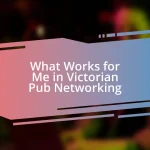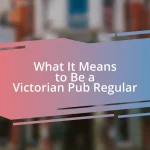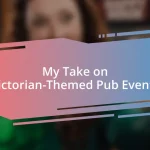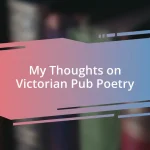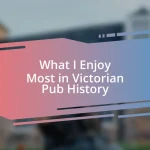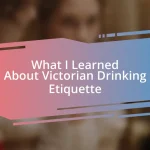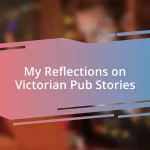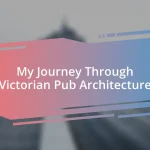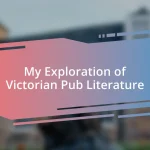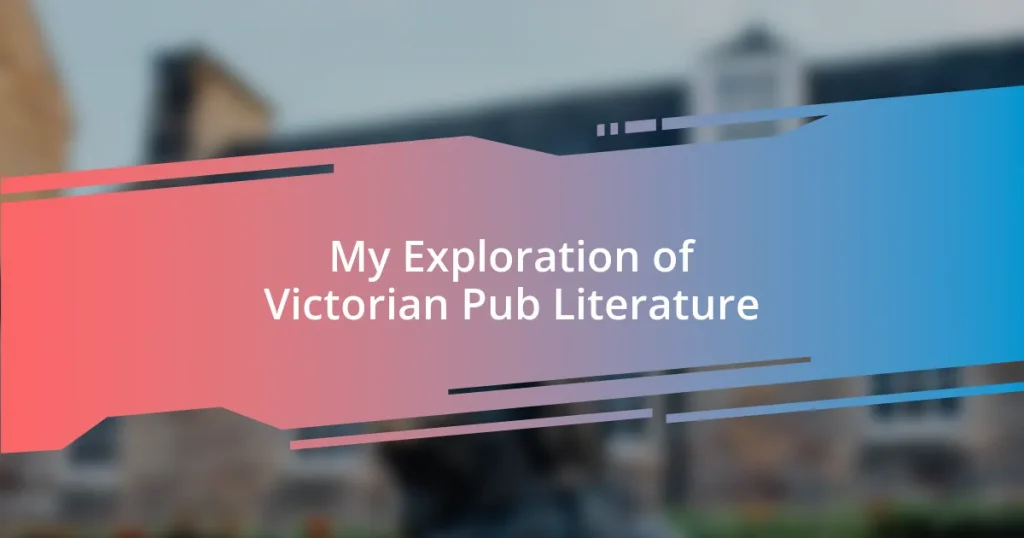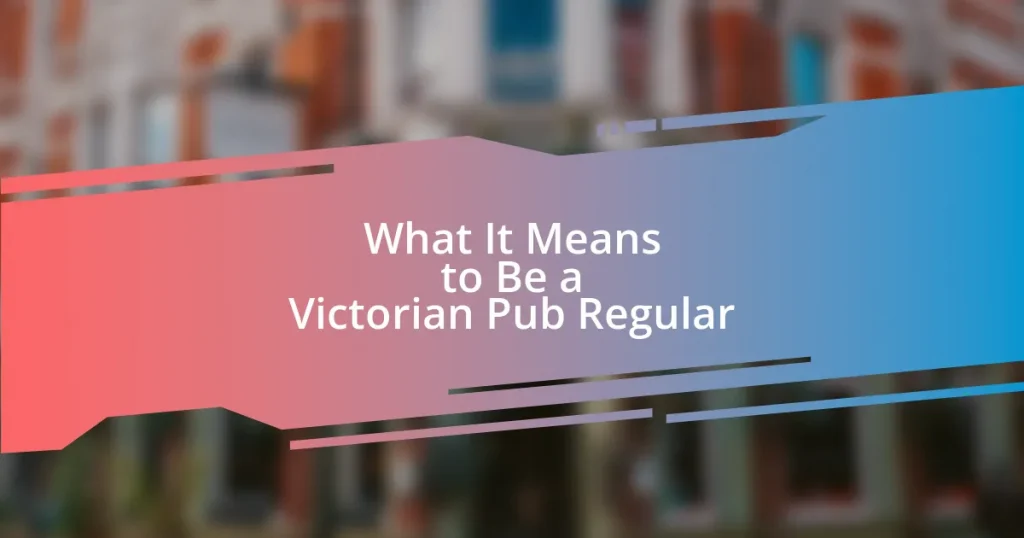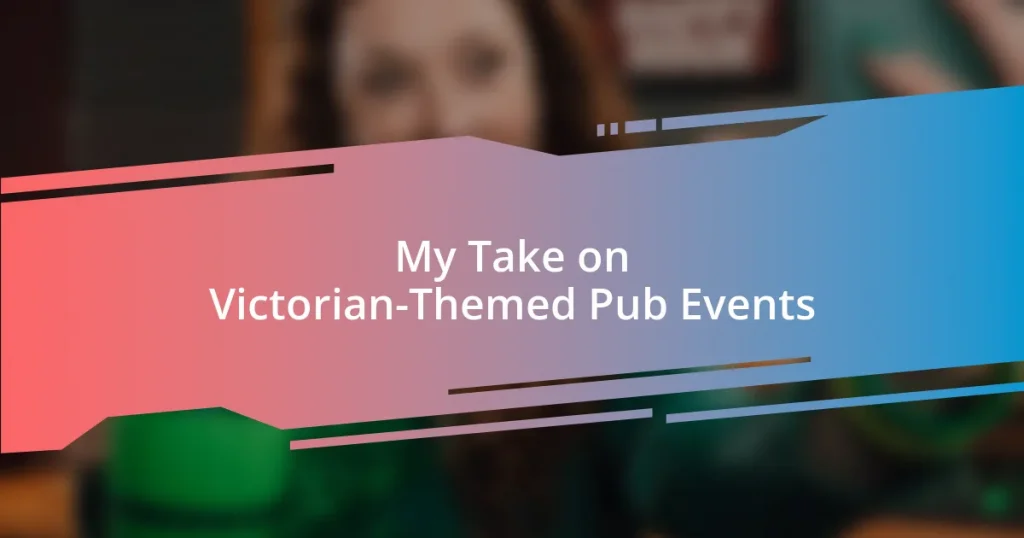Key takeaways:
- Victorian pub literature emerged in the 19th century, focusing on working-class experiences and social issues while being accessible to the everyday person.
- Key authors like Charles Dickens, George Eliot, and Thomas Hardy explored themes of poverty, class distinction, and communal camaraderie, often intertwining social commentary with engaging narratives.
- The genre influenced society by fostering discussions around morality and identity, encouraging readers to reflect on their own lives and society’s inequalities.
- Modern adaptations, including films and graphic novels, continue to resonate with contemporary audiences, showcasing the enduring relevance of the themes in Victorian literature.
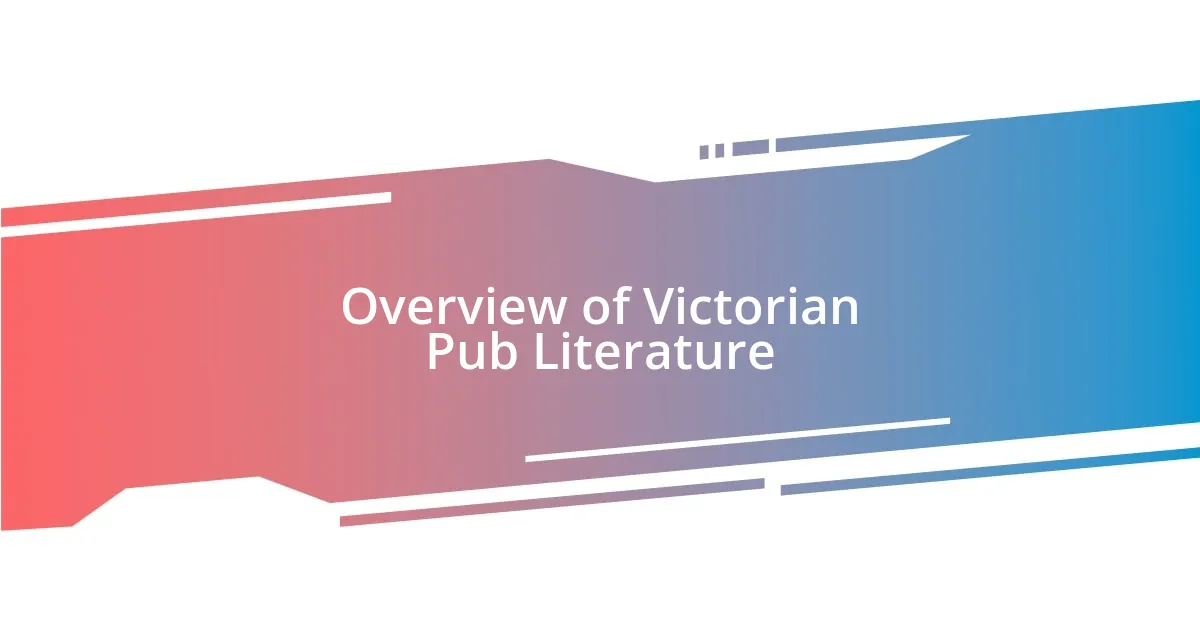
Overview of Victorian Pub Literature
Victorian pub literature emerged as a vibrant genre during the 19th century, capturing the essence of working-class experiences and the societal shifts of the era. I remember the first time I stumbled upon a collection of these works; it was as if I had opened a time capsule filled with raw emotions and human struggles. How remarkable is it that these simple, often ephemeral texts not only entertained but also sparked conversations about equality, morality, and the very fabric of society?
What sets Victorian pub literature apart is its accessibility; it was created for the everyday person, crafted to be read in a bustling tavern or a cozy corner of a pub over a pint. I can’t help but feel a sense of nostalgia thinking about those evenings, sipping a drink while lost in the pages of tales that mirrored the laughter and sorrow of those around me. These stories provided a vital connection between the written word and the life experiences of the pub-goers, making literature feel like a shared conversation rather than a solitary pursuit.
Additionally, the themes within Victorian pub literature often reflect a broader context of social change during the time. It’s fascinating how authors like Charles Dickens or George Eliot would weave elements of social commentary into tales that rang true for the common folk. Have you ever felt that a story resonated so deeply with your own life that it almost seemed as if the author was speaking directly to you? That’s the magic of this genre; it provided a voice for the people and stirred up a sense of camaraderie that transcended the written word.
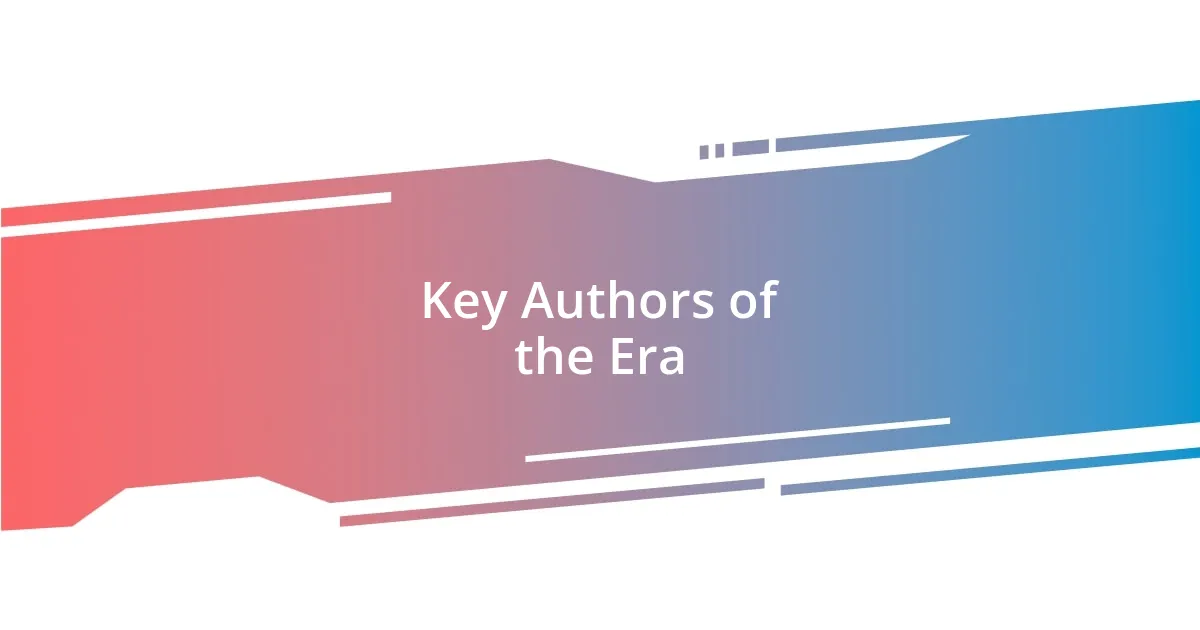
Key Authors of the Era
Among the key authors of the Victorian pub literature scene, a few stand out for their unique styles and resonant themes. One figure that comes to mind is Charles Dickens, whose vivid depictions of the struggles of everyday life etched deep impressions into the hearts of readers. I recall being deeply affected by his ability to illuminate the darkness of poverty while infusing humor and hope—a delightful juxtaposition that lingers long after the last page.
Here’s a brief list of other notable authors who contributed to this captivating genre:
- George Eliot: Masterful in her psychological insight, she explored the complexities of human relationships and society through rich narratives.
- Thomas Hardy: He painted landscapes of rural life, often juxtaposing them against the harsh realities of class struggles.
- Robert Louis Stevenson: Known for engaging storytelling, his works often delve into moral dilemmas, captivating readers with their thrilling plots.
- Daphne Du Maurier: Though slightly later, her blend of suspense and character-driven narratives created a distinct niche in pub literature.
Each of these authors brought forth a unique voice but shared a common connection to the essence of Victorian life, encapsulating the range of human emotion from despair to exuberance. I can’t help but feel that their words continue to resonate, whispering tales that still echo in the hearts of those who gather in modern-day pubs.
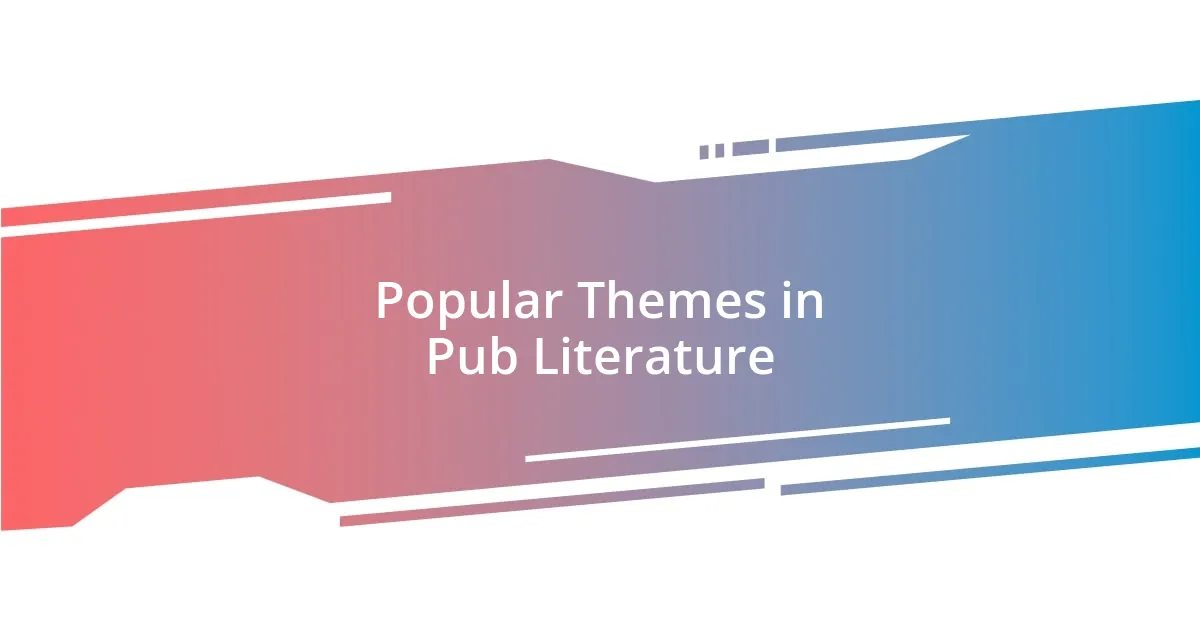
Popular Themes in Pub Literature
The themes in Victorian pub literature often delve deep into social issues like poverty, class distinction, and moral challenges. I remember sitting in a dimly lit pub, reading a passage that laid bare the harsh realities of working-class life. It was as if I could hear the clinking of glasses echoing the struggles of the characters, bringing those stories to life in a very visceral way. Such poignant reflections not only entertained but also urged readers to think critically about the inequalities that surrounded them.
Another recurring theme is the sense of camaraderie found in communal spaces like pubs. The narratives often explore human connections forged over shared experiences. I can still feel the warmth of fellowship as I imagine patrons laughing and debating topics drawn from the very pages they read. These stories advocate the importance of community, reminding me of the laughter shared among friends, revealing that the pub was not just a place for drinks, but also a venue for heartfelt exchanges and moral contemplation.
Moreover, the exploration of identity stands out as an essential theme too. Authors like George Eliot adeptly examined personal dilemmas against the backdrop of societal expectations. I once found myself reflecting on my own life choices as I read about a character grappling with societal pressures. Such moments truly resonate, offering a glimpse into the very fabric of our humanity and prompting introspection. Isn’t it fascinating how literature, even from a bygone era, can challenge our perceptions and inspire personal growth?
| Theme | Description |
|---|---|
| Poverty and Class Distinction | Explores the struggles and hardships of the working class, often illuminating societal inequalities. |
| Camaraderie and Community | Emphasizes the connections formed over shared experiences in pubs, spotlighting fellowship and conversation. |
| Identity and Societal Expectations | Examines personal dilemmas within the context of societal norms, prompting readers to reflect on their own identities. |
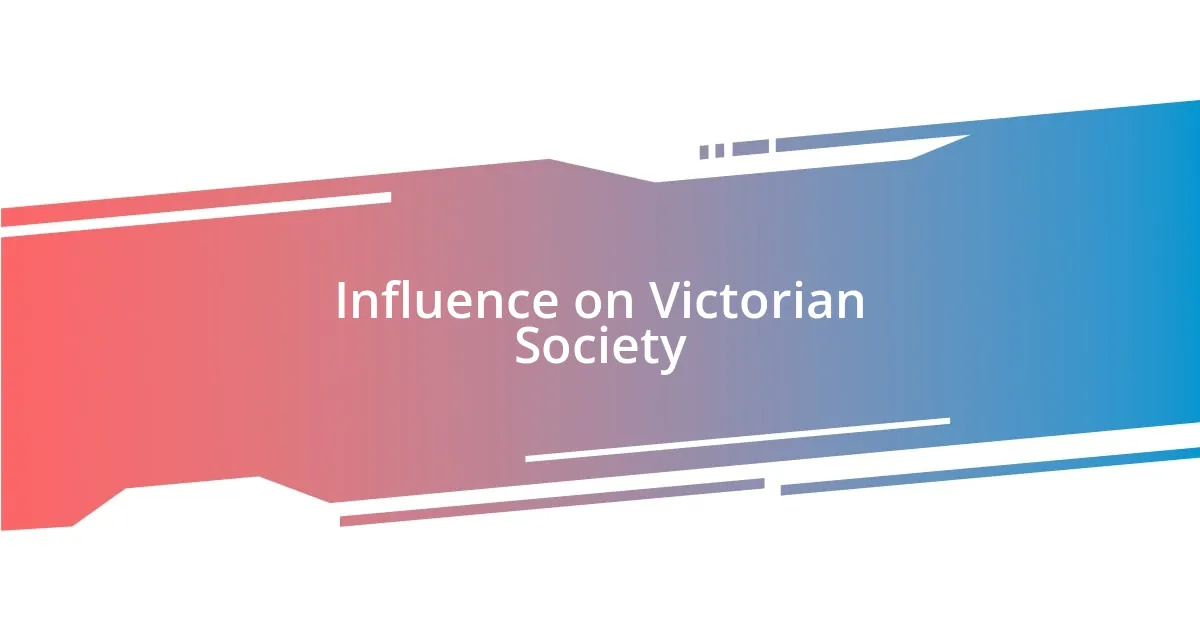
Influence on Victorian Society
The influence of Victorian pub literature on society was profound, as it shaped public discourse around pressing social issues. I remember once discussing a Dickens novel with friends over pints, where we dissected how his portrayal of poverty wasn’t just fiction, but a mirror reflecting the struggles of many lives. It made me realize how such discussions sparked awareness and empathy, urging us to care more about the societal inequalities around us.
Readers were not merely passive consumers of these stories; they became part of a community exploring their moral compass through literature. I think back to my time in a cozy, bustling pub, where friends would passionately debate the ethical dilemmas presented in Hardy’s works. Those conversations forged deeper connections among us, turning the pub into a space of intellectual exploration and shared values. Isn’t it remarkable how a simple story can ignite such vibrant discussions and foster understanding?
Additionally, the exploration of identity in this literature allowed individuals to confront their own personal dilemmas within a societal framework. I recall feeling a deep connection with a character struggling against societal expectations; it encouraged me to question my own path. Wasn’t it an eye-opening experience to see these fictional struggles echoing our real-life quests for identity and purpose? This dynamic interplay of literature and lived experience truly demonstrates the lasting impact Victorian pub literature has had on society.
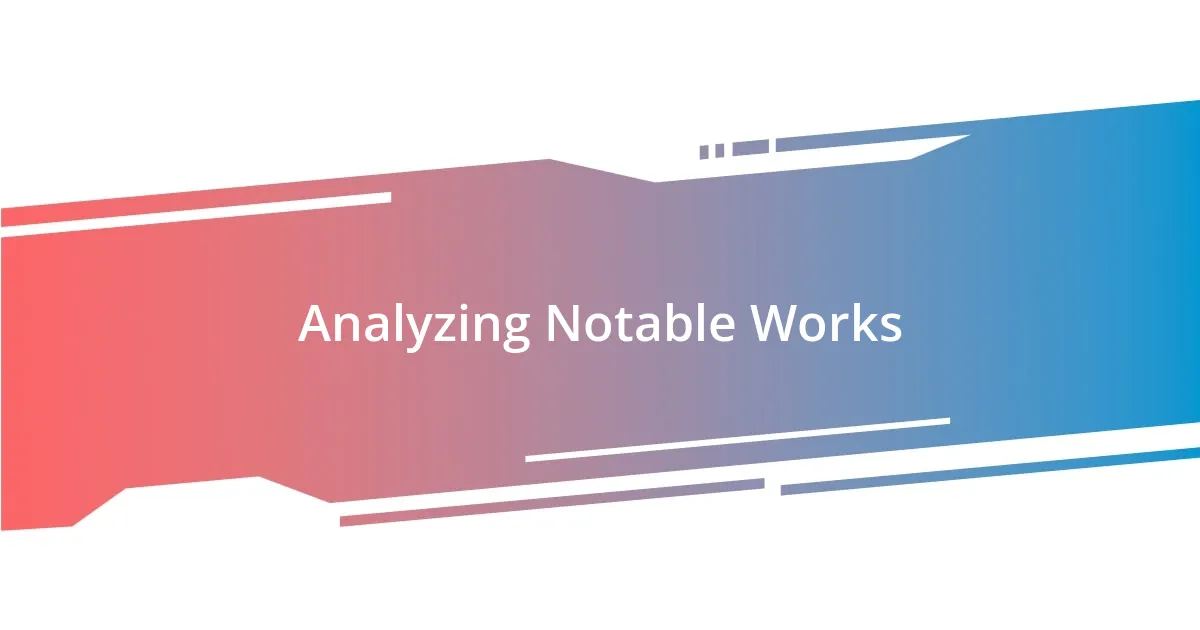
Analyzing Notable Works
When I think about the notable works of Victorian pub literature, Charles Dickens stands out prominently. His novel, Oliver Twist, is a vivid portrayal of the struggles faced by orphans during that time. I recall reading a passage where Oliver steals a loaf of bread out of sheer desperation. That moment struck me hard—it brought to the forefront the grim realities of survival. How could such a simple act reveal so much about society’s failures? Dickens expertly intertwines personal stories with broader social commentary, prompting readers like me to reflect on compassion and the moral dimensions of charity.
Another significant work is Thomas Hardy’s Tess of the d’Urbervilles. I remember diving into this narrative and feeling a whirlwind of emotions as Tess navigated societal expectations and personal tragedy. The depiction of her struggles made me question how societal judgments can unfairly shape our lives. Isn’t it powerful how literature captures our vulnerabilities? Hardy’s intricate characters compel me to confront biases and push for a greater understanding of individual circumstances.
Then there’s George Eliot’s Middlemarch, which intricately weaves the lives of several characters, each caught in their web of aspirations and societal constraints. I found myself resonating with Dorothea Brooke, whose idealism often leads her astray. Reflecting on her journey, I couldn’t help but ask myself—how do our ambitions and society’s expectations collide? Eliot’s exploration of these themes challenged me to think critically about my own life choices, constantly nudging me towards the importance of personal integrity amidst external pressures. It’s remarkable how these literary works resonate deeply, even generations later, inviting us all into a thoughtful analysis of the human experience.
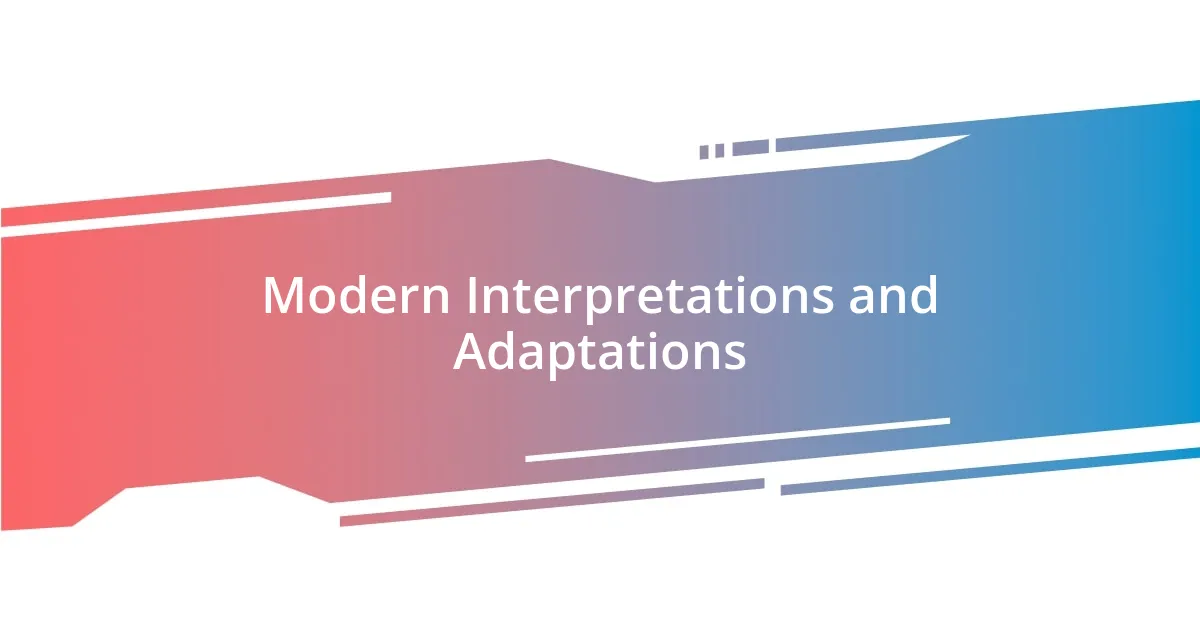
Modern Interpretations and Adaptations
When I explore modern adaptations of Victorian pub literature, I can’t help but feel a sense of excitement. For instance, I recently watched a film that reimagined Oliver Twist in a contemporary urban setting, making Oliver’s struggles with survival incredibly relatable even today. It struck me how the essence of his fight against social injustice remains relevant, reminding us that the themes of poverty and resilience transcend time. Have you ever noticed how some stories feel like they were written just for today’s audience?
I also love how stage adaptations breathe new life into classics. Attending a modern theatrical rendition of Tess of the d’Urbervilles left me teeming with emotion—seeing Tess’s turmoil unfold live made the injustices she faced all the more palpable. It was one of those moments that had me grappling with my own perceptions of right and wrong, much like Tess did. How often do we overlook the struggles of those around us in our daily lives?
Moreover, graphic novels have emerged as a dynamic medium showcasing Victorian themes. I stumbled upon a beautifully illustrated adaptation of Middlemarch that not only captured Eliot’s complex characters but also highlighted their emotional journeys in a fresh way. It ignited a discussion among my friends and me about how art can distill intricate narratives into something visually engaging. Isn’t it fascinating how a different format can challenge us to think differently about stories we thought we knew?

Resources for Further Exploration
When looking for resources that deepen my understanding of Victorian pub literature, I often turn to comprehensive anthologies. One that really stood out to me is The Oxford Book of Victorian Verse, which showcases a rich collection of poetry that echoes the sentiments of that era. Each piece pulls me into the emotions and struggles of the time, and it’s fascinating how these poems, often composed in pubs, capture the heartbeat of society. Have you ever felt that rush of connection with a poem that makes you ponder life in a new light?
Additionally, scholarly journals can be a treasure trove of insights. I frequently browse articles in Victorian Studies, where experts dissect various themes and cultural contexts within the literature. I was particularly moved by an analysis of community and belonging in pub poetry that reinvigorated my understanding of how local gathering places influence literary expression. Isn’t it amazing how delving into the academic side of literature can awaken a new perspective?
Lastly, online platforms like Project Gutenberg offer free access to a plethora of Victorian texts. I remember losing track of time while exploring works by authors like Wilkie Collins and George Meredith, marveling at their narrative techniques. Engaging with these original texts not only enhances my appreciation but also provides a direct line to the thoughts and feelings of readers from the past. Don’t you think there’s something magical about encountering literature exactly as it was intended, without the layers of modern interpretation?
